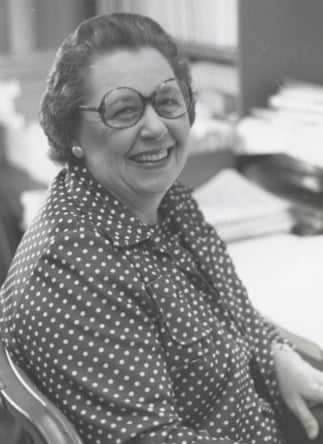
When Mary Trader joined Southern Research in 1966, she had a bachelor’s degree in chemistry from St. Mary’s Dominican College in her hometown of New Orleans and plans to stick around for one year.
Trader’s one year blossomed into a long career at Southern Research that saw her rise to head the Experimental Leukemia Section, where she played a significant role in the institute’s pioneering chemotherapy work.
“You can’t help but feel you have made some contribution to eradicating a dread disease,” Trader recalled in a 1981 interview marking her 25th year at Southern Research.
Because March is Women’s History Month, Southern Research is highlighting the contributions of several of the organization’s prominent female scientists over its 75 years of operation.
“Southern Research has been fortunate to have employed many great women scientists like Mary Trader in its history,” said Art Tipton, Ph.D., president and CEO. “Their careful and thoughtful work in our labs has deepened the scientific community’s understanding of cancer and other diseases.”
Trader’s career at Southern Research began as the search for new cancer-fighting drugs accelerated in its Birmingham labs, thanks to a steady stream of funding from the National Cancer Institute. For Trader, the first few years were spent in a crowded lab in the Ingalls West building.
“At the beginning of the screening program, there was already a backlog of drugs that had never been tested against cancer,” she recalled. “We had a field day testing everything the government had to send us.”
IN THE LAB
In 1973, Trader was appointed head of the Experimental Leukemia Section. Her lab conducted work in mouse leukemia that contributed to improved cancer treatments, particularly of acute lymphocytic leukemia, or ALL.
In those days, ALL spread rapidly and often fatally in children, but because of advances coming from Southern Research and other organizations, survival rates began to rise sharply.
The work performed by Trader’s team contributed to these advances in several ways. For one thing, her lab developed at least 20 lines of drug-resistant leukemias that proved useful in testing drug treatments. These resistant forms of leukemia were utilized in biochemistry and cell culture studies to expose the mechanism of drug resistance.
“We want to know why a drug does not work in a person’s body and what happens to it,” Trader said in 1980.
In addition, extensive testing carried out in Trader’s lab demonstrated the validity of famed Southern Research cancer researcher Dr. Howard Skipper’s theory that just one cancer cell can trigger the fatal disease. Skipper introduced the concept that every single cancer cell must be eliminated to ensure the survival of the patient.
“This added some basic knowledge to understanding the magnitude of the disease of cancer,” Trader recalled.
Her lab also conducted studies on combination chemotherapy that explored how new and existing drugs could be used together or in sequence as an effective treatment regimen for leukemia and many different forms of cancer.
“Everything we have learned — proper scheduling of drugs, problems of drug resistance and demonstration of one cancer cell’s impact — has tied in with increasingly successful treatment of children with leukemia,” Trader said in 1980.
‘INSTANT RECALL’
Soon after marking 30 years at Southern Research, Trader died from a heart attack in 1987. She was 64 years old.
Dr. Russell Laster, then head of the institute’s Cancer Screening Division, noted her immense contribution to the organization’s work. “She was like a computer with 30 years of storage and instant recall, and you can’t replace that.”
During her career as an experimental cancer chemotherapist, Trader contributed to at least 30 scientific papers, including several with Skipper and another prominent figure in cancer research, Dr. Frank Schabel. She also presented her leukemia findings at national meetings held by the American Association for Cancer Research and others.
